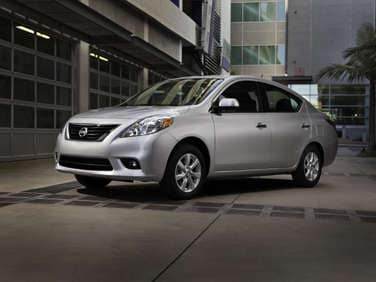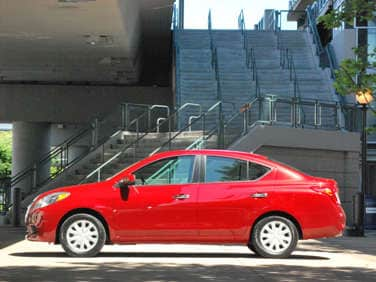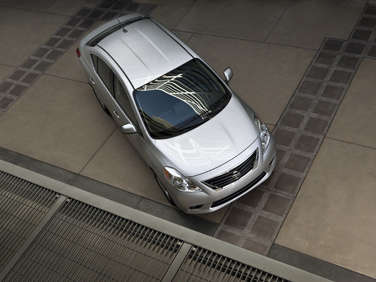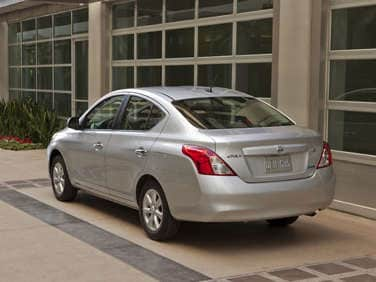Recent Articles
Popular Makes
Body Types
2012 Nissan Versa Trades More MPG for Less $$$

It's the end of an era: Now that pricing has been announced on the 2012 Nissan Versa Sedan—which will start at $10,990—the age of the sub-$10,000 car is officially over. But even though the starting price of the car has climbed $1,000, it will still have the lowest MSRP on the market and actually give Nissan an even stronger low-cost player than the 2011 model. The key here is that because Hyundai, Kia and Chevrolet have moved their subcompacts up the pricing ladder, there was enough room below the Hyundai Accent, Kia Rio and Chevrolet Sonic for Nissan to add air conditioning to the 2012 Versa Sedan's list of standard content and still have a notable price advantage over that trio.
And there's plenty of reason to believe that will translate into a notable sales advantage, too.
Versa: The Best-selling Subcompact of 2010
Except for the all-new Ford Fiesta, which didn't come online until later in the year, all the mainstream subcompacts were still pre-meltdown models in 2010, so none had the kind of upgraded content and performance that come with a complete redesign. Thus, the Versa's main contenders—the Honda Fit, Toyota Corolla, Hyundai Accent and Chevy Aveo—were all well matched and put up relatively similar sales figures. The Yaris scored 40,076 sales in 2010, while the other three ranged from 48,623 to 54,354. But the Versa itself sold a staggering 99,705 units for an increase of 20.3 percent as compared to 2010.
The Nissan's advantage over the second-place Fit was more than 45,000 sales. To put this into context, that difference far overshadows the gap between the Ford F-150 and the Chevy Silverado (on a percentage basis).
And remember, the essential difference between the Versa on the one side and the Aveo, Fit and Corolla was the Nissan's lower price. Then consider that this difference will be even further accentuated for 2012.

The Epitome of Low-cost Cool
At the top of today's column, I emphasized the addition of air conditioning to the Versa's standard equipment, and there's an important reason for this: A/C is the one major comfort feature I absolutely cannot do without in a new vehicle, so naturally I don't consider vehicles without it to be credible players in the marketplace. Yet some automakers still do use that old trick of offering a non-A/C vehicle to highlight the low cost of their entry-level models.
For example, the 2011 Kia Rio sedan starts at $12,295, and that seems like a high-value price tag, but only until you find out that it doesn't include standard air-conditioning. For that, you need to step into a Rio LX at $14,995. Needless to say, I wouldn't expect that price to come down when the all-new Rio debuts, especially when you note that a redesigned Accent with A/C starts at $14,595. The Fit starts at $15,100. You can conceivably get into an air-conditioned Fiesta sedan for $13,200, yet that's still $2,210 more expensive than the Versa. And while pricing hasn't been released on the Aveo replacement—the all-new 2012 Chevy Sonic—there's no reason to think it will be much less than the Fiesta.
Don't let the fact we're talking about just a couple of grand fool you, either. When you do the math, you get a Versa that will cost at least 20 percent less than its segment rivals. That's clearly a significant difference, and it's one that will hit very hard among people looking for cheap, basic transportation.

Tracking the Tradeoffs
Much of the difference in pricing between the Versa and the other subcompacts will come from differences in content and materials—although not necessarily dependability and quality—but there also will be one other crucial area worth looking at: Fuel efficiency. The Fiesta and Accent already have been certified at 40 mpg highway, and the Rio and Sonic are sure to join the club, as will the Fit once it gets its next redesign. But the best the Versa will be able to do is 38 mpg, and that's with its more expensive CVT. The base model, with its standard five-speed manual, is expected to get 36 mpg highway.
The inability to keep up with the Joneses, so to speak, in the EPA ratings is something I'd normally complain about, but in this case, the Versa's low price mitigates its slightly weaker fuel efficiency to a very large extent.
For whatever reasons, Nissan appears to have weathered this spring's double disasters in Japan better than either Honda or Toyota, and the company is carrying a fair amount of momentum in the U.S. marketplace. And what's particularly impressive is that Nissan is achieving this kind of performance by following its own strategies instead of just aping what the rest of the industry is doing: Witness the Nissan Leaf, the automaker's new foray into commercial vehicles with the NV lineup and the very affordable 2012 Versa, which goes on sale in August.
Maybe that's why Carlos Ghosn—the head of Nissan—is the highest-paid CEO of any Japanese automaker.
